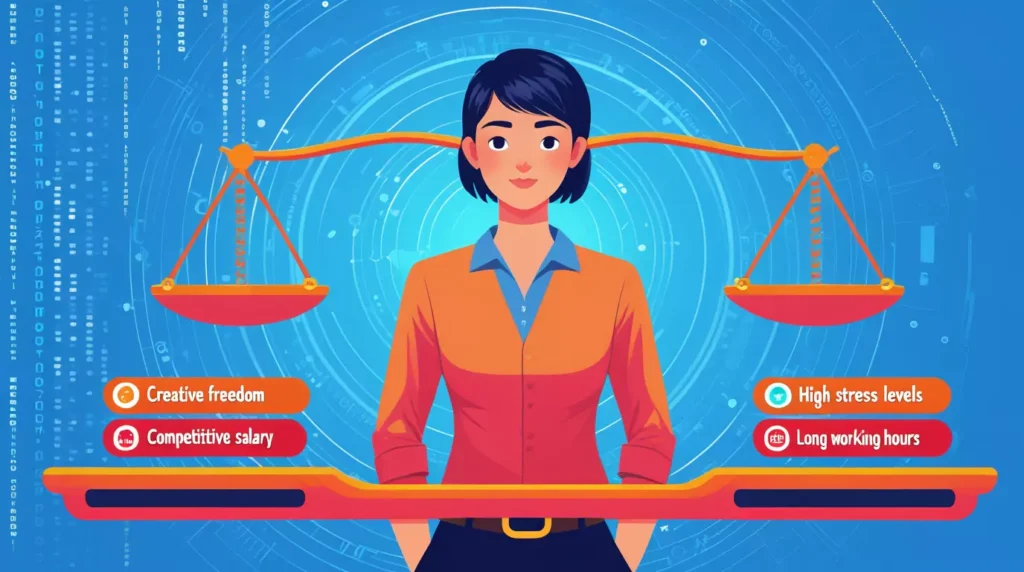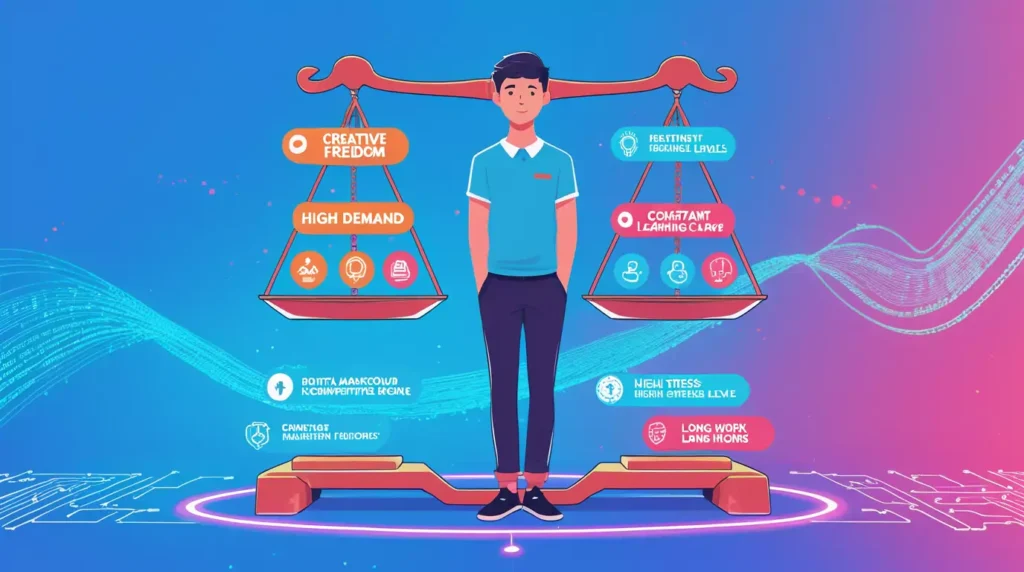Should You Choose Digital Marketing as a Career? Pros & Cons
Imagine this-you spend hours creating a website, posting content, and running ads, but barely anyone notices. Frustrating, right?
Jump to
ToggleNow, imagine someone else using the right digital marketing strategies and getting thousands of visitors overnight. That’s the power of digital marketing!
But here’s the real question: Is a career in digital marketing as exciting and rewarding as it seems, or does it come with hidden challenges?
With businesses shifting online faster than ever, digital marketers are in high demand. Some people make six-figure incomes working from their laptops, while others struggle to land their first client. The internet is filled with success stories, but what about the other side?
Is digital marketing truly a golden opportunity, or is it an overcrowded field where only a few succeed?
If you’re considering stepping into this career, you need the full picture-the good, the bad, and everything in between. In this blog, we’ll break down the real pros and cons of a digital marketing career, helping you decide if this path is right for you. Let’s get started!
Advantages of a Career in Digital Marketing

High Demand and Career Growth
The need for digital marketing professionals is growing rapidly. Businesses depend on digital strategies to reach their target audience, and they need skilled marketers to make it happen. Whether it’s SEO, social media marketing, content creation, or paid ads, companies are always looking for experts who can drive results.
This demand means job security. Unlike some traditional jobs that are becoming obsolete, digital marketing skills remain valuable across industries. You can work in retail, healthcare, finance, education, or any other sector that requires an online presence.
For example, a small business selling handmade jewelry needs digital marketing to reach customers through Instagram and Google. Likewise, a multinational company needs experts to manage its online advertising campaigns. With so many businesses relying on digital platforms, skilled marketers are always in demand.
No Formal Degree Required
Unlike professions such as medicine or engineering, digital marketing doesn’t require a specific degree. Many successful marketers have built their careers through self-learning, online courses, and hands-on experience.
If you have a passion for marketing and a willingness to learn, you can enter this field without spending years in college. Platforms like Google, HubSpot, and Coursera offer certifications that can help you gain knowledge and credibility.
For instance, someone who enjoys writing can start as a content writer, learn SEO techniques, and gradually move into content marketing. Similarly, someone with a knack for analytics can explore PPC advertising and become a Google Ads specialist.
This flexibility makes digital marketing a great option for students, career changers, and even stay-at-home parents looking for remote work opportunities.
Diverse Career Paths
One of the best things about digital marketing is the variety of career options it offers. You can specialize in different areas based on your interests and strengths.
Some of the most popular career paths include:
- SEO Specialist – Helping websites rank higher on Google
- Content Marketer – Creating blog posts, videos, and other content
- Social Media Manager – Managing and growing brand presence on social media
- PPC Specialist – Running paid advertising campaigns on platforms like Google and Facebook
- Email Marketer – Crafting email campaigns to engage and retain customers
You can work for a company, join an agency, or even start your own freelancing business. This flexibility allows you to switch roles and explore different aspects of digital marketing until you find what suits you best.
For example, someone who starts as a social media manager may later discover a passion for analytics and move into performance marketing. The possibilities are endless!
Disadvantages of a Career in Digital Marketing
While digital marketing offers many benefits, it also comes with challenges. Understanding these drawbacks can help you decide if this career is right for you.
Competitive Industry
Since digital marketing is easy to enter, many people are joining the field. This makes it highly competitive. To stand out, you need to constantly improve your skills, stay updated with trends, and deliver real results.
For example, if you’re an SEO specialist, you’ll need to keep up with Google’s algorithm changes. If you manage social media, you must adapt to new platform features and strategies. Without continuous learning, it’s easy to fall behind.
Many digital marketers also struggle to land high-paying jobs initially. Employers look for experience, so beginners may need to work on personal projects, internships, or freelance gigs to build a portfolio.
Fast-Changing Trends and Algorithms
Digital marketing is not a “set it and forget it” career. Search engines, social media platforms, and advertising networks frequently update their algorithms. What worked last year may not work today.
For instance, Google often updates its ranking system, affecting how websites appear in search results. Similarly, social media platforms like Instagram and Facebook frequently change their algorithms, impacting engagement and reach.
To succeed, digital marketers must stay informed, experiment with new strategies, and quickly adapt to changes. This can be stressful, especially for those who prefer a stable work environment.
High Client Expectations and Pressure
If you work in an agency or as a freelancer, managing client expectations can be tough. Clients often expect quick results, but digital marketing takes time. SEO efforts, for example, may take months to show significant improvement.
Handling multiple clients or projects at once can also be overwhelming. Meeting deadlines, creating content, analyzing data, and adjusting strategies require strong time management skills. If you don’t set clear expectations with clients, you may find yourself under constant pressure.
Irregular Income for Freelancers
While freelancing offers flexibility, it comes with financial uncertainty. Unlike a full-time job with a steady paycheck, freelancers must constantly find new clients to maintain a stable income.
Some months may bring in plenty of work, while others could be slow. This inconsistency can make it difficult to plan finances, especially for those who rely solely on freelance projects.
To overcome this, successful freelancers build long-term relationships with clients, diversify their income sources, and set aside savings for slower periods.
Screen Time and Mental Fatigue
Digital marketing involves spending long hours in front of a screen. Whether you’re creating content, analyzing data, or running ad campaigns, most tasks require continuous online activity.
This can lead to eye strain, headaches, and even burnout. Many digital marketers struggle with work-life balance, especially if they work remotely. Without proper boundaries, it’s easy to overwork and feel mentally exhausted.
Taking regular breaks, using productivity tools, and setting clear work hours can help maintain a healthy balance.
Who Should Consider a Career in Digital Marketing?
Not everyone thrives in digital marketing. It’s best suited for individuals who:

- Enjoy learning and adapting to new trends
- Have strong analytical and problem-solving skills
- Can manage multiple tasks and deadlines
- Are creative and love experimenting with strategies
- Prefer a dynamic work environment instead of routine tasks
If you enjoy working with numbers, you may be drawn to PPC and analytics. If you love storytelling, content marketing or social media could be a great fit. Assessing your interests can help you choose the right specialization.
How to Get Started in Digital Marketing
If you’re interested in digital marketing, here’s how to begin:

- Learn the Basics – Take free and paid online courses from platforms like Google Digital Garage, HubSpot, and Coursera.
- Pick a Specialization – Choose an area like SEO, social media, content marketing, or paid ads.
- Practice on Real Projects – Work on your own blog, offer free services to small businesses, or take internships.
- Build a Portfolio – Showcase your work with case studies and measurable results.
- Stay Updated – Follow industry blogs, attend webinars, and keep up with the latest trends.
Final Thoughts
Digital marketing is an exciting field with endless possibilities. It offers job security, career growth, and flexibility, making it a great choice for many. However, it also comes with challenges like high competition, changing trends, and work pressure.
If you enjoy learning, experimenting, and solving problems, this could be the perfect career for you. The key to success is continuous improvement, adaptability, and persistence.
Thinking about getting started? Take the first step by learning the basics and gaining hands-on experience. The sooner you start, the faster you’ll build the skills needed to succeed in digital marketing!







